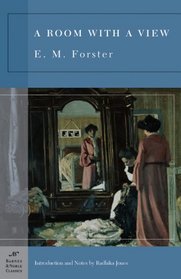Much funnier than I'd imagined. A quick read with some moments that are bound to stick with me for quite awhile.
Much better than the movie! The story contrasts the constraints of Edwardian social propriety with a world of spontaneity and passion. In it a young woman, whose only contact with moments of real emotion is playing Beethoven, awakens to find herself at odds with both worlds. A beautiful love story. Narration is excellent, but English accent takes some adaptation for American listeners: ha ha! another contrast of cultures!
'You can transmute love, ignore it, muddle it, but you can never pull it out of you.'
In this brilliant piece of social comedy Forster is concerned with one of his favourite themes: the 'undeveloped heart' of the English middle classes, who are here represented by a group of tourists and expatriates in Florence. The English abroad are observed with a sharply ironic eye, but one of them, the young and unaffected Lucy Honeychurch, is also drawn with great sympathy.
In her relationships with her dismal cousin Charlotte, with the unconventional Emersons and - the scene transferred to England - with her supercilious fiance, Lucy is torn between lingering Victorian proprieties, social and sexual, and the spontaneous promptings of her heart ('an undeveloped heart, not a cold one'). Thus there are hidden depths of meaning in this sunniest and most readable of Forster's novels.
This edition includes Forster's light-hearted sequel, 'A View Without a Room'.
I found EM Forsters A Room with a View to be a delightful coming-of-age story about love, passion, and self-discovery. When Lucy Honeychurch, chaperoned by her cousin Charlotte, checks into a Florentine pensione, Mr. Emerson offers to change rooms so she may have the title room with a view. A chance encounter with Mr. Emersons son George sparks romance -- or scandal? When we next see Lucy, shes back home in England, engaged to a gentleman named Cecil, but does she really follow through? The symbolism of rooms and views, as well as the backdrops of England and Italy, lends depth to the social interactions. Not only is EM Forster an astute observer of social conventions, but his prose (which strikes me as a cross between Jane Austen and Oscar Wilde) inspires the reader to believe life can be lived more fully, more passionately, more satisfyingly. This was a wonderful read worthy of its place on the list of 1001 books you must read before you die.




